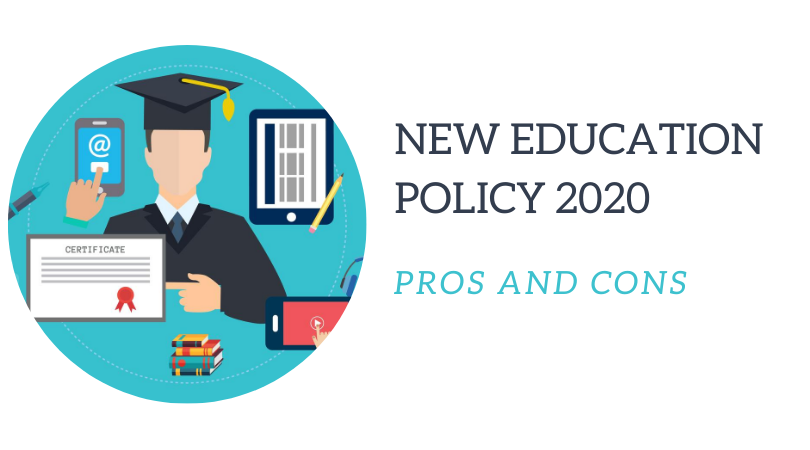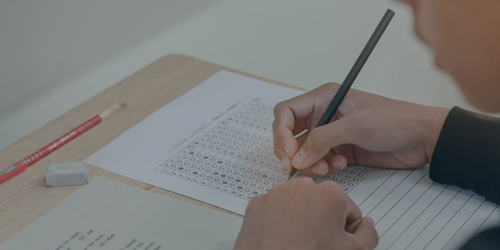After 34 years, there is a change in the education policy in India with the introduction of the New Education Policy 2020 (NEP). This new policy aims at universalization of education in India with a 100% gross enrolment ratio by 2030 for school education and 50% by 2025 for higher education. Like all other policies, the NEP 2020 also has its share of positives and negatives. Read more to know about them.

Check the NEP 2020, New Guidelines and Reforms of our Education Policy
Positives of NEP 2020
- With the help of the new education policy devised by the Government of India, education will be made available to everyone in the country from the pre-school to the secondary school level.
- NEP 2020 is beneficial as it will help about two crore school students to come back to educational institutions.
- The existing 10+2 structure will be replaced by 5+3+3+4 structure which will focus on the formative years of learning of a student. The structure corresponds to the age groups as follow:
- 3 to 8 years,
- 8 to 11 years,
- 11 to 14 years and
- 14 to 18 years.
- This constitutes 12 years in school and 2 years in pre-school for each student.
- NCERT has been given the job to design and develop the National Curricular and Pedagogical Framework for Early Childhood Care and Education (NCPFECCE). This will be for children within eight years of age.
- There will be a formation of National Book promotion Policy in India.
- Under this new education policy, National Mission on Foundational Literacy and Numeracy by the Education Ministry will be set up soon. The states in India will be responsible for the successful implementation for achieving the foundation numeracy and literacy for all students. This is applicable for student till class three and this has to be done by 2025.
- There will be board examinations like before in class 10 and class 12. But they will have lesser stakes and more stress will be given on the holistic upgrading of the student.
- School examinations will be only be held in classes 3, 5 and 8, and the other classes will be assessed by the school authorities.
- It has been announced that PARAKH will be set up soon. This will be a National Assessment Centre set up by the Government under the new education policy.
- Emphasis has been given on setting up Gender Inclusion Fund and Special Education Zones. This will be beneficial for underprivileged people.
- Bal Bhavans will be established in every state. This will be a boarding school where the students can take part in art, play or career-related activities.
- It has also been announced that a National Professional Standards for Teachers (NPST) will be formulated by the National Council for Teacher Education by the year 2022. This will be done after consulting with SCERTs, NCERT, teachers and institutions.
- There will be an establishment of an Academic Bank of Credit where the credits earned by the students will be stored so that it can be later on counted when the final degree is completed.
- Multidisciplinary Education and Research Universities (MERUs) will be set up in the country. These institutions will be at par with the existing IITs and IIMs and will aim to showcase multidisciplinary education for the Indian students.
- The public and private academic bodies will be guided by the same list of accreditation and regulation rules.
- The college affiliation will be phased out and colleges will be granted autonomy.
- A four year B. Ed degree will be recognised as a minimal degree for teaching by the year 2030.
- Online education will be promoted so that the students can be prepared for pandemic situations. This will also prepare the system while imparting quality education during such difficult times.
Also Read, NEP 2020: 10 Big Reforms for Colleges and Universities
Negatives of NEP 2020
- Language seems to be a negative factor in the National Education Policy 2020. India has the problem of a disturbing teacher and student ratio. So introducing mother languages in academic institutions for each subject is a problem. This is simply because finding a competent teacher is a challenge at times. And now the challenge is to bring study material in mother languages. The Indian Government wanted to follow in the steps of other countries like China, Germany, France where the foreign student needs to learn the language of the country to understand the country better. And India has 22 active languages and not one national language like in the other countries.
- Education Policy 2020 will further increase the differences between the sections of the society. While the students in the government schools will be taught in their respective regional language, the students in private institutions will be introduced to English from the early classes. This will further increase students who will not be comfortable with English as they will be introduced to the subject about seven years later than the students in private schools.
- Under the new system, one has to study for four years to complete their graduation. However, the question arises as to why the student will continue with the program if he/she can get the diploma in two years? If he/she left the program mid-way after two years, then he/she could easily have two years of experience of work which will be valuable in the long run.
National Education Policy has more positives than negatives. However, it is only after the execution that the people will finally be able to judge its effectiveness.











